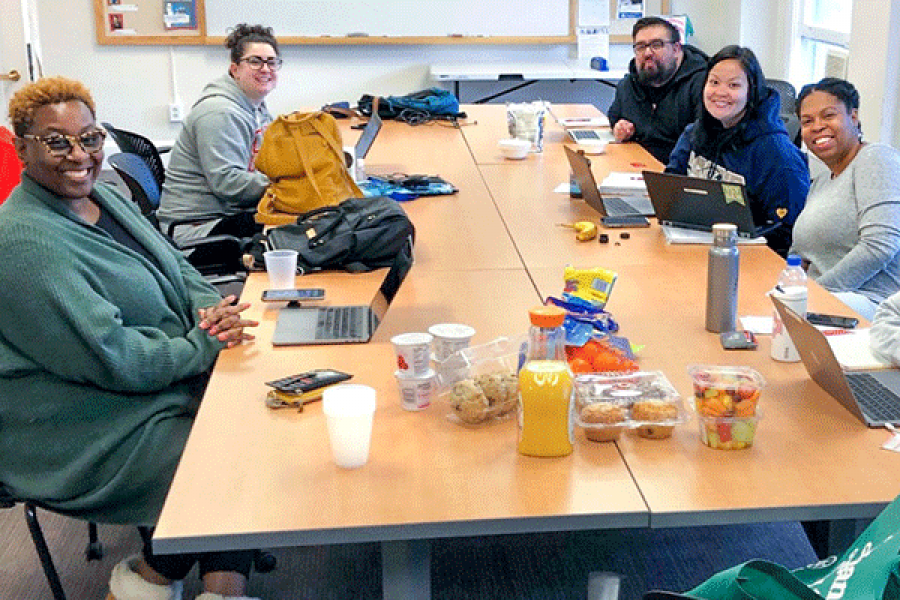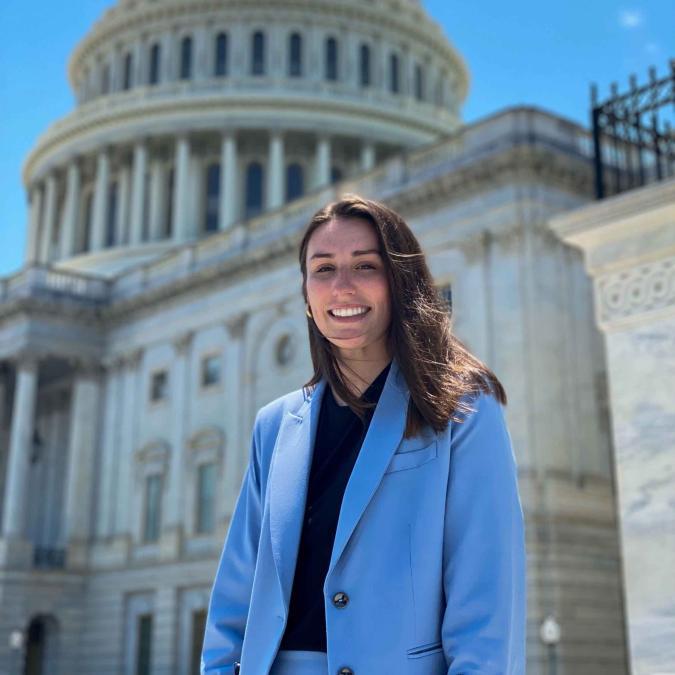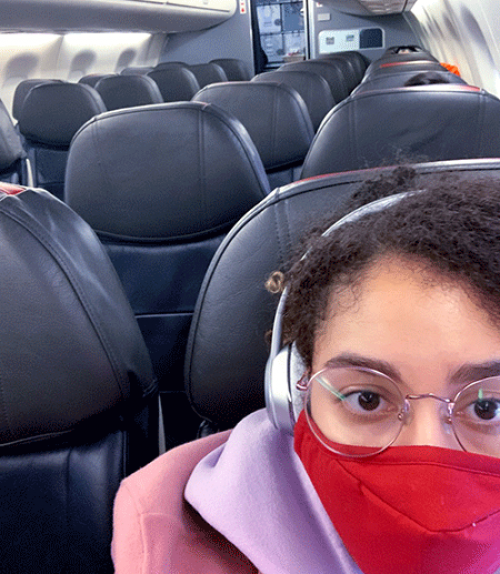Raven Schwam-Curtis ’20 had seen the coronavirus coming: She visited China and South Korea on a research trip over winter break, when the first cases were being reported there.
But she was still confronted with financial and emotional disruption when the pandemic forced Cornell to abruptly suspend classes in mid-March and switch to remote learning April 6, following spring break.
Within six days, Schwam-Curtis bid rushed goodbyes to friends and mentors, packed all her belongings into a handful of boxes and boarded a nearly empty flight home to Houston – incurring significant unexpected expenses.
She reached out for help to Cornell’s Access Fund, which supports lower-income students with certain basic and emergency needs. The fund reimbursed part of her shipping and flight costs.
“That relieved a huge financial burden,” Schwam-Curtis said. “The folks I was in contact with at the Access Fund went above and beyond to show up for our communities. It was really extraordinary.”
As the COVID-19 crisis escalated, the year-old Access Fund emerged as a pivotal player in the university’s pandemic response, helping eligible students get home and prepare for the shift to virtual instruction.
Over a three-week period that ended April 2, the fund distributed nearly $400,000 to support more than 1,000 students with travel, shipping, storage, technology – including more than 200 laptops purchased and delivered – plus rent and grocery relief for some graduate students. Another 130 students have received $38,000 in support since then.
The Access Fund opened in January 2019 with seed money provided by an alumni gift.
For students with demonstrated need, the fund typically reimburses up to $500 for expenses not covered by financial aid or other university programs. Examples could include a bus pass, gym membership, winter coat, medical expenses, professional attire for an interview or internship, or travel home to attend the funeral of an immediate family member.
The goal, said Vijay Pendakur, the Robert W. and Elizabeth C. Staley Dean of Students, was to provide microgrants to remove small barriers.
“There are so many aspects of a college experience that might not be fully accessible to low-income students,” Pendakur said, “even at a place that is as generous in financial aid as Cornell.”
Longer-term, managers of the fund hope it can help low-income students pursue transformational experiences like study abroad or unpaid internships. But the pandemic forced a pivot to emergency operations.
The Access Fund quickly began receiving an influx of requests. Additional staff and volunteers were mustered to review and service applications, effectively transforming the office into a mini-travel agency.
From bus trips to New York City to international flights, fund staff and volunteers made reservations online and by phone for overwhelmed students, monitoring breaking news about border closings and other travel limitations. They even provided gift cards to help with students’ luggage fees.
“Separate from providing financial support, being able to ease some of their concerns and provide reassurance was very fulfilling, and validated the sense of community we’re trying to create for all Cornell students,” said Shakima M. Clency, the Peggy J. Koenig ’78 Associate Dean of Students for Student Empowerment and director of First-Generation and Low-Income Student Support, the office that manages the Access Fund.
“We were able to take one worry in a season of worries off students’ minds,” said Marla Love, senior associate dean of students for diversity and equity.
Basirat Owe ’21, co-chair of Black Students United, one of many student organizations that contributed to the Access Fund during the crisis, praised the staff’s poise amid students’ feelings of chaos. “I saw the work, I saw the impact,” Owe said.
The surge in activity was made possible through generous donations, which are still being accepted.
Alumni Jennifer Wheary ’92 and Paul Walker ’93 quickly recognized that many first-generation and low-income students might lack the resources to relocate during the crisis. Those students might be the most economically stable members of their families while at Cornell and able to work student jobs, Wheary and Walker understood, but having to move home unexpectedly threatened to upset that precarious financial balance. With those concerns in mind, the couple donated $50,000 to the Access Fund.
“The crisis is a huge blow to the stability of first-gen and low-income students and their families on so many levels,” Wheary said. “We wanted to give Cornell the ability to respond quickly and creatively to their needs.”
The gift’s rapid timing provided the additional funding necessary to immediately assist students getting home, according to leaders of the division of Student and Campus Life.
The Student Assembly, Student Activities Funding Commission and Senior Days contributed more than $100,000 in reserve funds and programming fees. The Graduate and Professional Student Assembly pitched in $60,000 in reserve and programming funds, including $50,000 matched by the Graduate School. In all, student organizations, the Graduate School, and numerous schools and colleges donated funds totaling more than $275,000.
“Especially during a pandemic, when fewer people have family safety nets and more issues are coming up, something like the Access Fund is really crucial,” said Arielle Johnson, a third-year Ph.D. student in the field of plant biology and chair of the GPSA’s Finance Commission.
Students’ needs weren’t limited to travel and laptops.
For example, the fund has helped students lacking quiet, private spaces at home to purchase headphones, enabling them to focus on virtual classes.
Daniel Sabzghabaei, a third-year doctoral student in the field of music composition, had relied for his work on pianos and keyboards in Lincoln Hall. After the campus shut down, he applied for and received modest funding for an electronic keyboard he could use at home to help prepare for end-of-semester exams.
“I’m very thankful for the Access Fund,” Sabzghabaei said. “They set me up with a keyboard that was extremely important in my doctoral research and in my work as a composer.”
The fund helped Terra Hurtado ’22 switch to an earlier flight home – arriving just before San Francisco issued shelter-in-place orders – and pay for luggage fees and a taxi to the airport. She said the process was surprisingly easy and fast.
“Looking back on it, it could have been a very dark spot in my college career, and it sort of wasn’t,” Hurtado said. “Everybody was pulling together, and it felt like more of a triumph rather than a scary moment.”
Lily Bagher ’21 also received help flying back to northern California, support that she said sealed her decision to return home during a period of enormous uncertainty.
“It also made me a lot more reassured,” Bagher said, “that Cornell University was going to make an effort to support me in whatever way possible.”
After navigating the initial crisis, the Access Fund anticipates higher demand when applications resume in the fall, even with Cornell planning to significantly boost its financial aid budget.
“The fund has turned out to be really critical in this moment for Cornell to continue to serve its most vulnerable populations equitably,” Pendakur said. “But even post-pandemic, this fund is necessary.”






